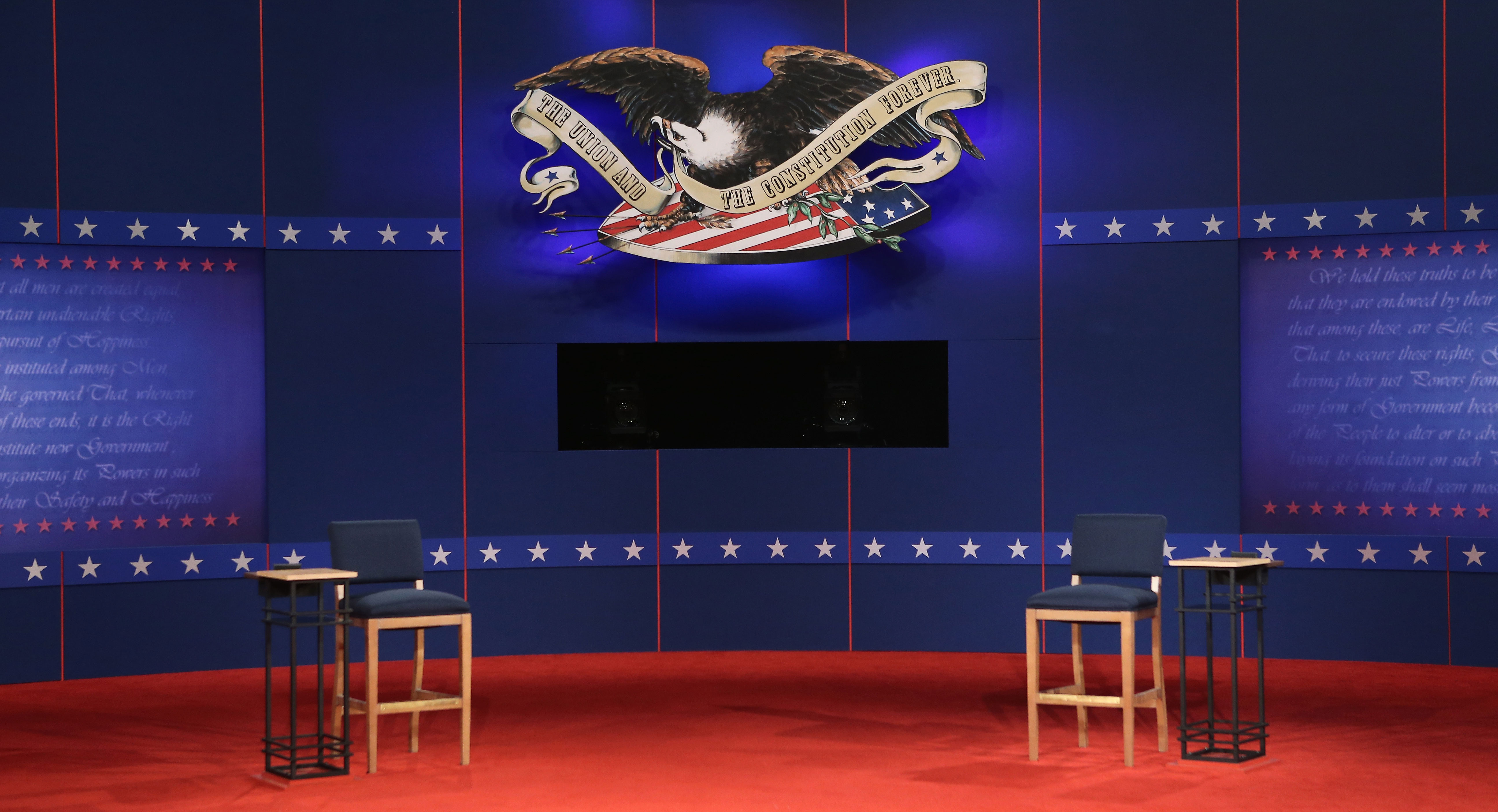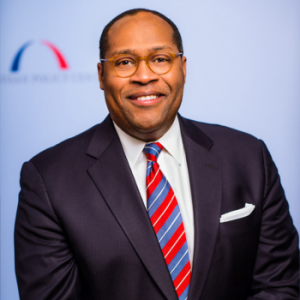
When Hillary Clinton and Donald Trump square off against each other in the first presidential debate at Hofstra University, it will be one of the most widely anticipated events in recent political history. Democrat vs. Republican. Insider vs. outsider. Longtime public official vs. businessman and reality TV star.
A record 46.2 million households tuned into the first debate between Barack Obama and Mitt Romney in 2012. This year’s match-up could very well top that. In anticipation of the contest, we asked five veteran political leaders and communications experts for their take on the match-up, what they would like to see, and the advice they would give to the candidates when they take the stage on September 26th.
_________________________________
The Diva vs. the Death Metal Band
by KIM ALFANO

I’ll start this article with a BIG caveat. What I write here is based on the world as it exists on September 7, 2016. And we all know that this race for President changes by the second. So I’ll present the best advice I have for the candidates TODAY for the upcoming debates which are a world away.
The first thing we all know is the personality of these two candidates is central to this race. I’d liken Hillary Clinton’s style to that of an opera singer – if she is clinical and mechanical in the debates, her performance will be boring and forgetful; if she’s curt or angered by Donald Trump’s attacks, she’ll seem like a diva. However, if she brings a level of humanness, and passion and skill, she may be triumphant.
If Donald Trump succeeds in bringing some civility and depth on issues to his “bite the head off the bat” style, while at the same time maintaining the mantle of authenticity and “everyman” understanding, he will blow her away
Donald Trump is more like a Death Metal Band. He is deeply appealing to a small group of people who will not be told he is anything but brilliant. But will it be possible for him to pick just the right song that changes that perception for the rest of the electorate? Will he be able to convince them that his style is not just screaming and spitting and tearing up the stage, but actually music? You know, can he sing a song that soccer moms will listen to with their kids to seem cool? Can he tame his usual hard core performance enough to speak to a wider audience, yet still be more dynamic than the boring opera singer? If so – if he can pull that off – he’ll kill it.
The bottom line is this: If Hillary can ditch her robotic, VERY political, legalistic style and come across as passionate and a friend of the people – she will have a great night. If Donald Trump succeeds in bringing some civility and depth on issues to his “bite the head off the bat” style, while at the same time maintaining the mantle of authenticity and “everyman” understanding, he will blow her away. (Not literally).
Kim Alfano is one of the country’s leading media strategists who has advised such Republican leaders as Governors Mitch Daniels and Terry Branstad.
_________________________________
What Women Want
by CARRIE ALMOND

The upcoming debates give Donald Trump the opportunity to win the hearts and minds of the American people – 53 percent of whom are women.
As President of the National Federation of Republican Women (NFRW), I have spent the past four months traveling the country in a red, white, and blue RV named Rosie, after my Grandmother.
Across more than 20,000 miles and 35 states, I’ve listened to Republican women, as well as Independents, and even Democrats. They tell me they don’t want to vote for Hillary – they don’t trust her and they don’t like her.
Women want to see the man beyond the bluster – the compassionate, caring father described so compellingly by the Trump children at the Republican National Convention.
But many are waiting for Donald Trump to earn their vote. Here are some key points they will be listening for in the debates.
- Be Presidential — Hillary is going to try her best to bait Trump. He mustn’t bite. He needs to be the adult in the room – steady, confident, and ready to lead.
- Let Us Inside — Women want to see the man beyond the bluster – the compassionate, caring father described so compellingly by the Trump children at the Republican National Convention.
- Trump the Woman Card — Hillary talks about fighting for women, but her record shows the hypocrisy of her words. Donald Trump can contrast this with his impressive record of hiring and promoting based on the ability to get the job done. As Ivanka so succinctly put it: “My father is color blind and gender neutral.”
- Focus on the Real Stakes — Women are concerned about safety from terrorists abroad and violence at home. They are concerned about jobs and opportunities for their children. Keep the focus on the failed Clinton-Obama record. And for values voters, two words: Supreme Court.
- Results Matter — Donald Trump thinks big, and delivers. For Americans who believe their government is broken, this is a powerful contrast to Hillary Clinton, whose supporters struggle to name a single accomplishment.
At our biennial convention last fall, the NFRW conducted a poll. We asked women which characteristics were most important in choosing a nominee for President.
More than three-fourths (76 percent) chose “being a strong and effective leader.”
The debates give Donald Trump the opportunity to show that he will be that leader. If he takes advantage, he will seal the deal with America.
Carrie Almond is President of the National Federation of Republican Women.
_________________________________
The Fine Line of Aggression and Likability
by BRETT O’DONNELL

In the final Democrat Primary debate of the 2008 New Hampshire campaign, then Senator Hillary Clinton fielded a question about her “personality deficit.” After admitting that her opponent was “very likable,” then Senator Obama famously replied that Clinton was “likable enough.” She has attributed her perceived “deficit” to learning to control her emotions while attempting to advance through her legal education and career, protecting her from sexist attacks. She readily admits and understands the negative perception she creates. And it is that perception that may make her too tough in the presidential debates.
Presidential debates are won and lost by walking the fine line of aggression. To win you have to be perceived as competent and prepared for the job, connected to the audience, likable, but also dominant over your opponent. Walking that line of aggression and likability is surely a challenge to both candidates this cycle and is a skill so daunting that few candidates for the presidency have been able to master it. Ronald Reagan and Bill Clinton are recent examples. It is the ability to simultaneously charm the audience and disarm your opponent. Donald Trump crosses the line from charming to churlish frequently, but gender communication research confirms that we are more forgiving of naked aggression in men than women and so our perception of his aggression will likely be perceived more positively than those moments when Hillary attempts to train her fire on Mr. Trump.
Presidential debates are won and lost by walking the fine line of aggression.
Additionally, Secretary Clinton doesn’t help herself by consistently playing more defense than offense, particularly as she continues to struggle to explain her careless handling of her emails and classified material. This line of attack seems to uniquely expose her “personality deficit.” If Mr. Trump is able to stay disciplined and use the emails to continue to undercut her trustworthiness, Secretary Clinton could be in for three long debates. To win, Clinton has to be able to pivot out of the “corner” of these attacks and get on offense herself, but in doing so, she has to be able to walk the tightrope of charm and aggression. So far, that has been a significant challenge for her.
Brett O’Donnell is a Republican Communications Consultant who has helped prepare five presidential candidates for presidential debates, including President George W. Bush, Senator John McCain, Congresswoman Michele Bachmann, Governor Mitt Romney and Senator Lindsey Graham.
_________________________________
A Study in Contrasts – and Low Expectations
by ALAN SCHROEDER

Have two presidential debaters ever presented a more striking contrast than Hillary Clinton and Donald Trump? Consider the differences: female versus male, political insider versus political outsider, preparation versus improvisation, caution versus looseness. No wonder ratings for the 2016 debates are expected to go through the roof.
As a debater, Clinton brings a number of assets to the exercise, not the least of which is experience. In three campaigns over 16 years, she has engaged in many one-on-one debates, and while it is true that Donald Trump participated in nearly a dozen Republican face-offs this cycle, he has never shared the stage with just one opponent.
This experience has given Clinton a keen understanding of the debate arena. Her past performances reveal someone who knows how to attack and defend, how to listen, and how to agreeably disagree. Her command of information is solid, and she displays no signs of discomfort or intimidation. For each debate, Clinton prepares and strategizes. With Trump, we can expect her to draw upon her legal background, building and prosecuting a case.
Trump holds one enormous advantage: low expectations. Against a pro like Clinton, he will be judged by less rigorous standards.
Yet this same efficiency of approach could hamper Clinton. Campaign debates are live events with a mind of their own. Trump understands this; he uses the volatility of live TV to create an advantage for himself, to subvert the decorum.
By traditional measures Trump is not a good debater. He is most comfortable onstage alone, not sharing the spotlight. In the primary debates Trump trafficked in insults instead of policy nuances. Although this brazen approach caught his Republican opponents off-guard, Clinton will not be so easily ambushed. Furthermore, in a long-form, two-person match, trash talk and platitudes can only go so far.
Still, Trump holds one enormous advantage: low expectations. Against a pro like Clinton, he will be judged by less rigorous standards. And in the unpredictable realm of TV debates, that may be enough.
Alan Schroeder is a Professor at the Northeastern University School of Journalism and the author of Presidential Debates: Risky Business on the Campaign Trail (Columbia University Press, 2016)
_________________________________
At the End of the Day, Will the Debates Even Matter?
by ROBERT TRAYNHAM

Americans are eagerly anticipating this year’s presidential debates between Hillary Clinton and Donald Trump. Conventional wisdom gives Clinton the edge. She is more experienced, substantive and disciplined. By contrast, Trump is an erratic political novice who has never competed head-to-head in a debate. That said, 2016 has been anything but conventional.
Historically, general election candidates prepare for debates by studying policy positions and by developing simple sound bites to often nuanced positions on complex issues, all the while trying to put their opponent on the defense.
The clearest exception to this is Ronald Reagan. During the 1984 debates, Reagan successfully stuck to broad themes and avoided policy discussions. His sunny optimism and classic faulting of Walter Mondale’s “youth and inexperience” were highly effective, in part because Reagan was already well positioned with a broad coalition of the American electorate.
Clinton must find a way to translate public trust in her abilities (competence) into trust in her words and actions (integrity).
Unfortunately for Trump, that’s not the case. Trump lacks diverse support and his message is pessimistic. He offers no policy solutions. General election voters will want a positive message, more policy details and greater discipline from him. Otherwise, Trump may successfully double down on bombast and distraction through his usual antics (just ask Bush and Cruz).
Without question, Clinton will perform well. Her knowledge, experience, and stature are significant assets. However, she suffers from a massive trust deficit with voters and seems incapable of speaking or behaving with sufficient transparency. Clinton must find a way to translate public trust in her abilities (competence) into trust in her words and actions (integrity). Torturous, evasive answers to debate questions will blunt her prospects, as could how she handles Trump’s expected below-the-belt punches (just ask Bush and Cruz).
We’ll see how conventional the campaign ends up on Election Day and if the debates even mattered anyway.
Robert Traynham serves as Vice President of Communications at the Bipartisan Policy Center. He previously served as a senior aide and press secretary for former Senator Rick Santorum.




